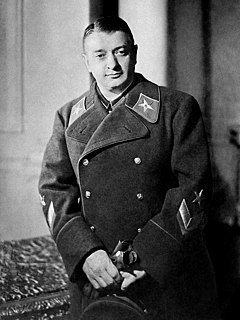Heinrich Lewenthal
Marshal of Swetania Heinrich Lewenthal | |
|---|---|
 Lewenthal in September 1935 | |
| Birth name | Lorenz Koehler |
| Born | 1 December 1892 Heienhaus, Duchy of Lithidia-Ascania, Sunrosian Monarchy |
| Died | 15 March 1971 (aged 78) Laidi, Lėnasla Canton, Swetania |
| Buried | |
| Allegiance | |
| Years of service | 1914-1937, 1949-1952 |
| Rank | Marshal of Swetania |
| Commands held | Sunrosian Revolutionary Front |
| Wars | Winter Revolution Revolutionary Campaigns Great War Swetanian-Weranian War |
| Awards | Order of the Three Arrows Hero of the Military Revolution (thrice) Medal for Service in the Winter Revolution Medal for Service in the Defence of the Revolution |
| Spouse(s) | Caroline Rehn (m. 1913; d. 1921) Mélodie Thévenet (m. 1938) |
| Children |
|
Heinrich Lewenthal (born Lorenz Koehler; 1 December 1892 – 15 March 1971) was a Swetanian revolutionary and military leader who served as the first Marshal of Swetania, the first and one of the only two people to hold the title. He was one of the leading figure of the Winter Revolution in 1921 and was elected commander-in-chief of the Swetanian forces during the Great War from 1931, overseeing some of the Revolutionary Forces most decisive victories. Lewenthal is honoured as one of the foremost Revolutionary Founders of Swetania.
Born to a middle-class Weranic family in the Grand Duchy of Sunrosia, Lewenthal was first introduced to socialist thought while studying at the University of Coerz and notably to the works of Nikolaus Lewenthal, the source of his revolutionary pseudonym. Financially unable to continue his studies in the aftermath of the Great Collapse, Lewenthal joined the 33rd Infantry Regiment of the Imperial Sunrosian Army in 1914, where he became further radicalised after entering into contact with members of the Roselein Circle. He served throughout the Airdale War and was wounded twice and captured thrice. Increasingly concerned by the officers' disregard for soldiers' casualties, Lewenthal deserted while on leave, joining with the proscribed Sunrosian Section of the Workers' International and participating in the agitation against the war.
Lewenthal was among the protesters during the Leneys Street Incident, traditionally marking the beginning of the Winter Revolution. He rapidly emerged as one of the most competent commander on the revolutionary side, succesfully defending Coerz from a counter-offensive and decisively defeated Paulus von Kalwis' Eastern Sunrosian Army in December, becoming recognised as the paramount military authority in Cisvetania. Lewenthal was present at the declaration of the Panswetanian Council Republic on 21 January 1922, where he pledged his "unfaltering loyalty to the socialist revolution and the Panswetanian dream". He became one of the driving force behind the newly-founded Revolutionary Armed Forces, and oversaw the transformation of the disparate force into a modern, innovative military based on socialist ideals.
Initially opposing a Swetanian entry into the Great War – a conflict he personally considered to be "the old world's death throes" – at least until the modernisation of the armed forces was complete, Lewenthal eventually submitted to the popular will of the General Congress when it declared war on Gaullica on 1931. As Marshal and thus commander-in-chief, he had a role in planning several major offensives, including the Battle of Kabogamin, Operation Sickle, and its follow-up Operation Hammer. Dissatisfied with his role as kingmaker in the fallout of the failed Red Rebellion in Estmere and concerned about the excessive military influence in politics he brought, he resigned from the military the following year and disappeared from the public eye, only returning in an advisor capacity during the Swetanian-Weranian War.
He died of old age in 1971, having spent his retirement with his second wife and his children, only publically appearing at military celebrations out of duty for the soldiers that were once under his command. Militarily, Lewenthal is credited with laying the bases for the theory of deep operations and for the first large-scale integration of aviation and mechanised forces into military doctrine. In Swetania, where his legacy is that of a highly principled revolutionary putting his socialist ideals above his own opinions, Lewenthal has consistently ranked among the top in polls about the greatest Swetanian figures, and internationally he is remembered as a key leader of the Grand Alliance instrumental to the victory in Euclea.